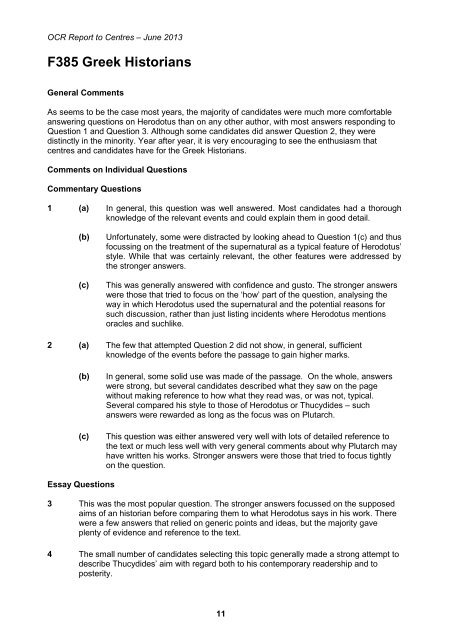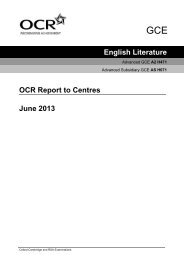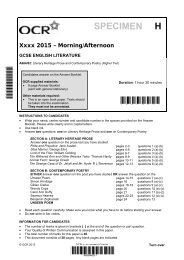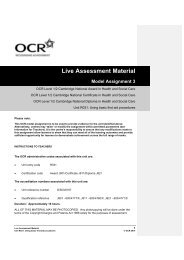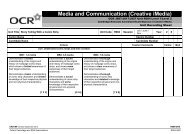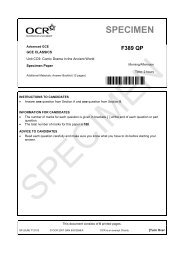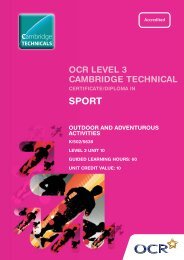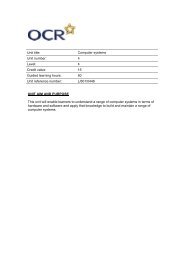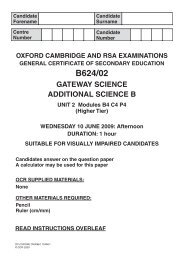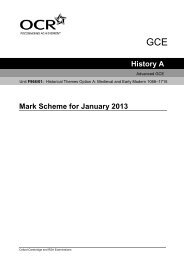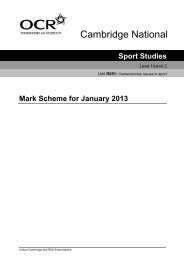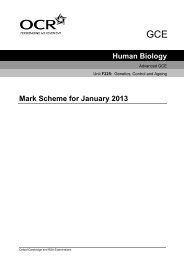Examiners' reports - June (PDF, 440KB) - OCR
Examiners' reports - June (PDF, 440KB) - OCR
Examiners' reports - June (PDF, 440KB) - OCR
Create successful ePaper yourself
Turn your PDF publications into a flip-book with our unique Google optimized e-Paper software.
<strong>OCR</strong> Report to Centres – <strong>June</strong> 2013<br />
F385 Greek Historians<br />
General Comments<br />
As seems to be the case most years, the majority of candidates were much more comfortable<br />
answering questions on Herodotus than on any other author, with most answers responding to<br />
Question 1 and Question 3. Although some candidates did answer Question 2, they were<br />
distinctly in the minority. Year after year, it is very encouraging to see the enthusiasm that<br />
centres and candidates have for the Greek Historians.<br />
Comments on Individual Questions<br />
Commentary Questions<br />
1 (a) In general, this question was well answered. Most candidates had a thorough<br />
knowledge of the relevant events and could explain them in good detail.<br />
(b)<br />
(c)<br />
Unfortunately, some were distracted by looking ahead to Question 1(c) and thus<br />
focussing on the treatment of the supernatural as a typical feature of Herodotus’<br />
style. While that was certainly relevant, the other features were addressed by<br />
the stronger answers.<br />
This was generally answered with confidence and gusto. The stronger answers<br />
were those that tried to focus on the ‘how’ part of the question, analysing the<br />
way in which Herodotus used the supernatural and the potential reasons for<br />
such discussion, rather than just listing incidents where Herodotus mentions<br />
oracles and suchlike.<br />
2 (a) The few that attempted Question 2 did not show, in general, sufficient<br />
knowledge of the events before the passage to gain higher marks.<br />
(b)<br />
(c)<br />
In general, some solid use was made of the passage. On the whole, answers<br />
were strong, but several candidates described what they saw on the page<br />
without making reference to how what they read was, or was not, typical.<br />
Several compared his style to those of Herodotus or Thucydides – such<br />
answers were rewarded as long as the focus was on Plutarch.<br />
This question was either answered very well with lots of detailed reference to<br />
the text or much less well with very general comments about why Plutarch may<br />
have written his works. Stronger answers were those that tried to focus tightly<br />
on the question.<br />
Essay Questions<br />
3 This was the most popular question. The stronger answers focussed on the supposed<br />
aims of an historian before comparing them to what Herodotus says in his work. There<br />
were a few answers that relied on generic points and ideas, but the majority gave<br />
plenty of evidence and reference to the text.<br />
4 The small number of candidates selecting this topic generally made a strong attempt to<br />
describe Thucydides’ aim with regard both to his contemporary readership and to<br />
posterity.<br />
11


